Aging Pets are inevitable. But the love between an owner and their pet, knows no limit. No matter the age.
Your beloved pet, just like you, will inevitably age, and their needs will change over time. It might feel like just yesterday that your aging pets were a playful bundle of fluff, but now they’re entering a new life stage. As they say, time flies when you’re having fun, and we’re sure your pet has been enjoying every moment with you.
Help Your Furry Friend Age Gracefully with Great Nutrition
Different animals have various life stages respective to them, and advancements in feeding and nutrition have allowed our pets to live healthier and longer lives. Just as you’d feed a baby animal different food to support their growth, matured animals require an age-appropriate diet to thrive.
For DOG’s
Dogs are typically considered mature after reaching 7 years of age, with larger breeds reaching maturity a bit earlier. To keep your dog as fit and healthy as possible, consider these dietary adjustments:
- Light / low calorie food – to help keep the middle age spread at bay!
- Supplements like Glucosamine and Chondroitin to maintain joint and cartilage health. (So you can still enjoy those lovely walks).
- Senior balanced diets with quality nutrients for optimal vitamin and mineral absorption, promoting eye sight, skin, coat, and nail health.
- Some older dogs may prefer wet food for improved digestion.
For CAT’s
Cats have their unique requirements. Mature or middle-aged cats are usually between 7 and 10 years old, while senior cats fall within the 11-14 year range. Some cats may even reach 20 years and beyond. To keep your feline friend in top condition, offer age-appropriate food that your finicky cat will actually enjoy. There IS a food out there that your cat WILL eat for more than two days on the trot! (we all know a fussy cat who demands variation. Or is that just our cat Arnold?!)
“As with dogs, cats need care to support their wellbeing with a balanced age appropriate food.”
Don’t forget small animals:
For rabbits, adulthood begins around 1 to 5 years old, depending on the breed. Giant rabbits mature faster, typically around 9 months. Small to medium rabbits are considered seniors between 6-8 years old, while giant rabbits reach senior status at 4 years old.
Regardless of age, to keep your bunny hopping into old age. All rabbits need fresh hay, greens, and water. Age-appropriate nuggets provide essential dietary requirements. Be cautious with supplements unless prescribed by a vet, as they can be harmful. Your rabbit should get all they need from their diet.
“We all know with age, things change. For your pet it is not any different.”
Just like humans, pets’ needs change with age. Remember when you could eat anything without gaining weight or feeling discomfort? Now you only need to glance at a doughnut to see the difference. Choosing the right food to support your pet’s changing dietary needs is crucial. Look no further than our range of pet foods, from adolescence and adulthood to senior and geriatric. We offer various flavors within the product you are viewing.
At Pet Supplies Sussex, we’re here to cater to your pet’s unique needs.
For any specialist requirements or to discuss the best way to manage your pet’s diet, feel free to contact us at info@petsuppliessussex.com. While we can provide advice, always consult your vet for any significant concerns.
Pets aging gracefully is an art, and your pet deserves to enjoy life to the fullest!
